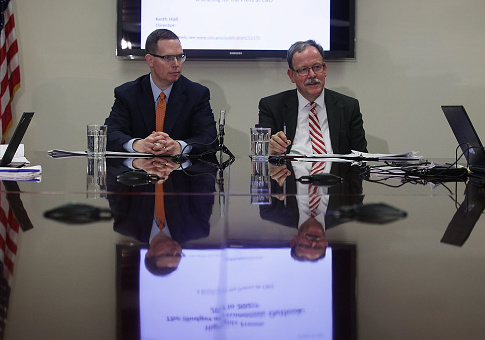Government employees earn roughly 17 percent more in total compensation than private-sector workers in similar jobs, according to a report from the Congressional Budget Office.
Including both wages and benefits, the budget office compared the total compensation of similar workers who work for the federal government and those working in the private sector.
Workers who have a high school diploma or did not graduate at all earn 53 percent more in the federal government than they do in the private sector. Those individuals with a bachelor’s degree earn a total compensation that is 21 percent higher in the federal government than in the private sector.
The federal government, however, does not compensate workers with professional or doctorate degrees more. In fact, the budget office finds that the federal government pays these workers 18 percent less on average than private-sector employees with similar characteristics.
"For workers with a bachelor's degree or less, the cost of total compensation averaged about $60 per hour worked for federal employees, compared with about $46 per hour worked for employees in the private sector with certain similar observable characteristics," the budget office said.
"Overall, total compensation was about 17 percent higher, on average, for federal workers than for similar private-sector workers, indicating that the government spent about 17 percent more on total compensation than it would have if it provided its employees compensation equal to that of their private-sector counterparts," they said.
Total compensation includes both wages and benefits. While both were higher for those in the federal government, benefits increased at a greater rate for federal workers than wages did.
For example, workers with a high school diploma saw 34 percent higher wages than private-sector workers and 93 percent higher benefits than those in the private sector. Similarly, workers with a bachelor’s degree saw 5 percent higher wages in the federal government and 52 percent more benefits than those in the private sector.
However, federal employees with higher education received 24 percent less wages and 3 percent lower benefits than their private-sector counterparts.
The report notes that the government could have saved money if it spent more on higher-educated workers, instead of spending higher wages on the lower-educated workers.
"The federal government would have reduced its spending on wages by 3 percent if it had decreased the pay of its less educated employees and increased the pay of its more educated employees to match the wages of their private-sector counterparts," the report said.
The trend to pay federal employees more than their private-sector counterparts has increased over time. From 2005 through 2010, workers earning a high school diploma or less received 36 percent more in the federal government than in the private sector. From 2011 to 2015, that percentage increased to 53 percent.
Those with a bachelor's degree in the federal government earned 15 percent more than in the private sector from 2005 through 2010, but jumped to 21 percent from 2011 to 2015.
